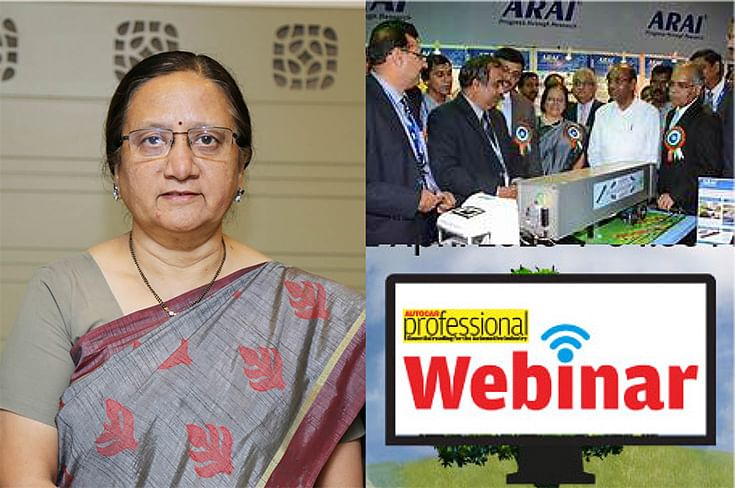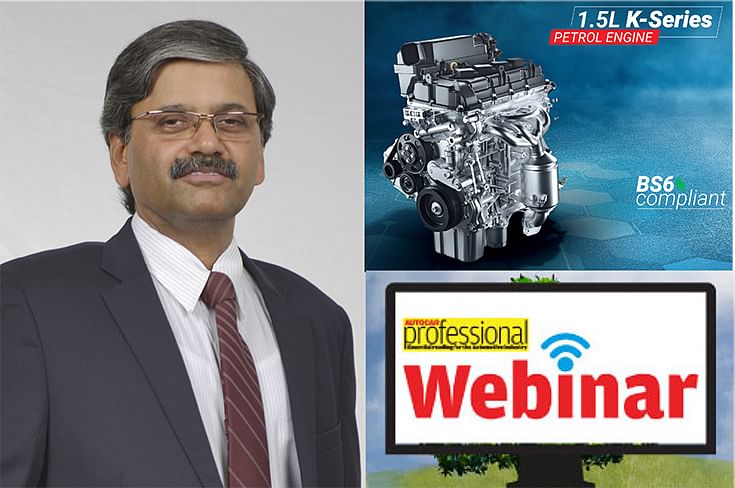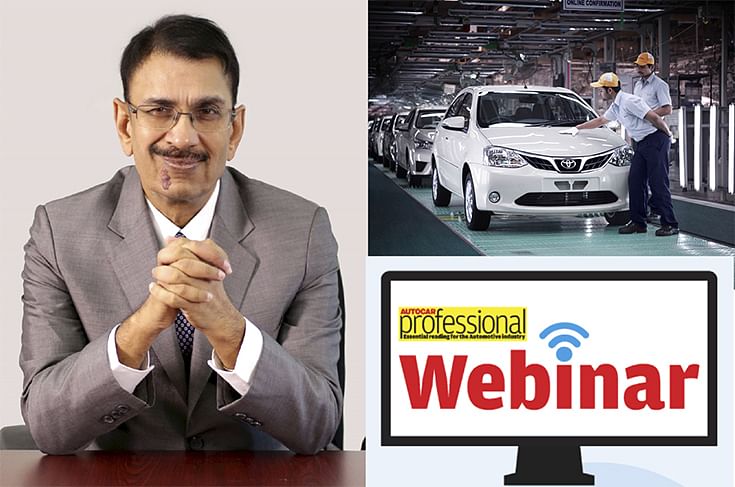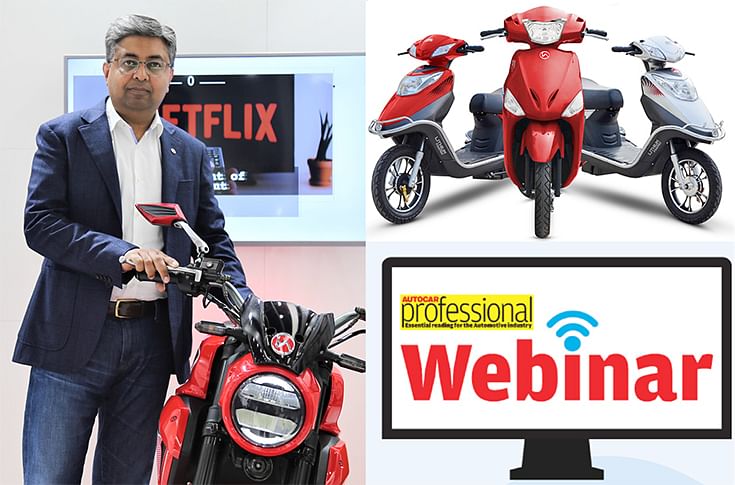For the second time this month, experts from the Indian automotive industry held sway on a number of burning issues, in the form of a digital-first webinar as the country continues to be in the grip of a lockdown.
Autocar Professional's webinar on the theme of 'Driving towards a Greener, More Sustainable Auto Industry', held fittingly enough on April 22 -- 50th World Earth Day, a global event which marks the anniversary of the birth of the modern environmental movement in 1970. Considering that the latest World Air Quality Report sees India rank fifth globally with 21 out of the 30 most-polluted cities being in the country with average PM2.5 levels exceeding WHO recommendations by a shocking 500 percent was yet another reason enough for the webinar.
This webinar, hosted 11 days after Autocar Professional hosted a webinar on 'Rising to a Challenge: Business in the Midst of a Pandemic', came 22 days after India drove into a BS VI world at the stroke of April 1 midnight. While the new cleaner fuel may not give immediate freedom from pollution, the road to lesser greenhouse gases and a more eco-friendly industry is paved with other challenges.
These and a host of other interesting topics, in a time of multiple disruptions, technological as well as ecological, were the subject of a lively debate between four stalwarts of the Indian automotive industry representing the R&D and testing side, IC engine passenger vehicle OEMs and India's leading electric two-wheeler manufacturer.
- Rashmi Urdhwareshe, Director, ARAI (Automotive Research Association of India)
- Sekhar Viswanathan, Vice-Chairman, Toyota Kirloskar Motor
- C V Raman, Senior Executive Director - Engineering, Maruti Suzuki India
- Naveen Munjal, MD, Hero Electric and President, SMEV (Society of Manufacturers of Electric Vehicles)

These four top-level industry executives, who together constitute a powerhouse of in-depth knowledge, expertise and experience in the automotive industry, spoke on an expansive range of issues, be it regulations, India Auto Inc's speedy upgrade to BS VI, the changing consumer mindset in a time of social distancing and the ubiquitous electric mobility, which bears a lot of promise but needs far more charge than it is getting at present.
Moderated by Autocar Professional's Executive Editor Sumantra B Barooah, the webinar proved to be a platform for these four leaders to share ideas, insights and perspectives aimed at helping the Indian automotive industry to be greener and more sustainable than what it is now. Here's looking at what they said.
ARAI's Rashmi Urdhwareshe: ‘India needs more testing centres, dismantling standards and a scrappage policy.'

Rashmi Urdhwareshe, Director at Automotive Research Association of India (ARAI), an Autocar Professional News Maker of 2019, has literally broken the glass ceiling in the male-dominated Indian automotive industry and her contribution towards developing new emission regulations in the country has been laudatory. She believes that though recent transition to BS VI emission norms in record time is something to cheer about, a lot more needs to be done going forward in this direction.
According to Urdhwareshe, “Sustainable transportation for India needs research in three key areas of vehicle technology (powertrain design changes), alternate fuel (assessment for emission, vehicle performance and material compatibility) and operational driving pattern (laboratory simulation)."
Urdhwareshe pointed out that the integrated approach for clean air in the automotive sector involves government policies and incentives, road/public infrastructure, fuel/energy management, regulations and standards, vehicular technology solutions and control of in use vehicles.
She is of the opinion that the approach needs to tackle real emission on roads as firmly as emission in the testing labs, “An air quality management planning study indicates a need for fleet modernisation and migration to BS VI. That has already started but reducing the real emission levels and improving road infrastructure are critical.”
She emphasised the need for a strategic approach towards embracing green mobility and the challenges for the EV segment. “India needs more testing centres. Dismantling standards and a scrappage policy need to be firmed up further. As regards eco-system development for EV initiatives, the government needs to work in this direction along with taking steps for active work in repair and maintenance of EVs as well,” she added.
Maruti Suzuki India's CV Raman: ‘Change in buying patterns likely once the lockdown ends.'

In his presentation, CV Raman, Senior Executive Director (Engineering), Maruti Suzuki India, first lauded India Auto Inc for achieving BS VI compliance in a scant and record 3 years. “What Indian engineers have been able to achieve in three years has been actually lost in amidst the Covid-19 pandemic. It was actually a reason to celebrate for the automotive and oil and gas industry. It is interesting to note that BS VI development started before BS VI fuels were made available. For instance, when Europe announced its move to Euro 6 emission norms, the fuel was made available 5 years before the cut-off date.”
Raman detailed how Maruti Suzuki tackled the BS VI challenge with more than 50 applications being developed simultaneously. With multiple models and variants in its product portfolio, Maruti Suzuki conducted over 250 homologation tests and approximately 60 lakh kilometres of validation tests.
He outlined how Maruti Suzuki India’s engineering team was constantly working to meet the stringent deadline. All this also translated into high cost and investment. He added that “customers do not necessarily want to pay a premium for emissions and safety regulations. We need to therefore look at cost optimisation.”
According to Raman, “Change in consumerism is likely once the Covid-19 lockdown ends. An attitudinal change and tendency to save more is likely. People will spend less on luxury and demand for shared mobility is likely to go down in near-term. Digitalisation will see higher penetration, and the work-from-home culture may change the way companies do business, thus limiting the need to travel. We may also see reverse migration. Urban economy may lead to global recession. Companies need to redraw cash-flow strategies. There could be various scenarios and industry needs to take proactive steps for a rapid recovery in the Indian market.”
On the issue of sustainability and eco-friendly alternatives, the four panellists were united in their urgent call for formalising a scrappage policy to cut down pollution. “We as automakers need to look at what we can do to improve air quality. The first was BS VI, and the second is to reduce old polluting vehicles, and also look at new alternate energy mix. With a Scrappage Policy, the automotive industry can further reduce carbon dioxide emission by 31%,” pointed out Raman.
The industry veteran said the government should opt for a technology agnostic approach, which will not only help reduce pollution at a faster level at a lower cost, but also help meet the energy mix needs of the country. He said that the government can promote alternate fuel vehicles (CNG, ethanol, methanol) and hybrids, along with EVs.
Raman suggested four factors the industry should focus on to achieve sustainable and clean mobility –energy security, policies to modernise existing polluting fleets, proper infrastructure planning and development to support new-age mobility and development of India-specific affordable solutions.
Collaboration, according to him, will be the way forward, “We will need to collaborate to provide a better environment. I believe India has the potential and the human capital. If there's a collaborative effort from all stakeholders including government, we can solve the current issues that are there and drive towards innovative greener sustainable solutions for customers, keeping in mind the cost, aspiration and needs."
Toyota Kirloskar Motor's Shekar Viswanathan bats for scrappage policy and electric vehicles

Think Toyota and the image of the company's green leaf flashes into mind. The Japanese carmaker regards the protection of the global environment as one of its top priority concerns. At every stage of a vehicle's life, Toyota strives to protect the environment through reducing energy use and minimising waste. This is amply witnessed at all operations of its Indian arm, Toyota Kirloskar Motor along with the 310,000 units per annum manufacturing facility in Bidadi, Karnataka.
Given this background, it was not surprising that Shekar Viswanathan, Vice-Chairman, Toyota Kirloskar Motor, called for an immediate rollout of the much-awaited vehicle scrappage policy by the government of India to get older, polluting vehicles quickly off the road.
“A scrappage policy is the urgent need of the hour. It will have beneficial effects on the environment by removing older cars, scooters and commercial vehicles that are still running on prehistoric emission norms in a short time. A short timeframe means a minimum period of three to five years; during this time, we should have as many BS VI vehicles on the roads as possible," he said.
Viswanathan, who is a strong advocate of hybrid vehicles and technology, also batted strongly for electric vehicles (EVs). He said the case for EVs in India couldn’t been stronger than at present. The world over, the automotive industry is working aggressively to develop cleaner mobility solutions including a much sharper focus on EVs and hybrids than before. He, however, cited his concern that the domestic auto industry, which has the responsibility of generating employment and enough revenue for the government, might suffer with growth of EVs due to the significant hit the automotive ecosystem will take, given the relatively lesser number of parts compared to an internal combustion engine (ICE) vehicle.
“An ICE vehicle comprises over 30,000 parts. If we need more employment, then we ought to have more vehicles using cleaner BS VI fuel. While more electric vehicles will mean a faster shift to cleaner mobility, it will also mean lesser jobs,” he pointed out.
“The other disconcerting factor with respect to EVs is that these vehicles in India are presently taxed at 5 percent, which while is a good move from an environment perspective, needs to be reviewed by the government for its impact on public finances,” added Viswanathan.
“The revenue generated by ICE vehicles should ideally be replaced by EVs even if it takes the next decade. As we see more and more EVs replace ICE vehicles, we would see the revenue shrinking and as a result, going forward, the government will be tempted to keep hiking the taxes on EVs," he explained.
The route to EV self-sufficiency,according to Viswanathan, will lie in establishing EV battery manufacturing plants in India and that the demand pattern will drive the localisation and need for indigenisation.
Answering a webinar attendee's query on range extender vehicles, Viswanathan responded by saying, "The definition of range extender vehicles is built around hybrid vehicles and they're called range extenders only because one has the option of using both electric drive and ICE powertrains."
"Future products coming from Toyota will include hybrid and electric vehicles because as we make the gradual disconnect from ICE, the hybrid will be a good technology to hop on to, before eventually stepping to EVs. At the end of the day, the customer will dictate what technology to make, based on the cost and degree of convenience. So, whatever products we design, we need to assess them on the equation of whether they solve their (customers') affordable mobility needs while minimising carbon emissions," he concluded.
Hero Electric's Naveen Munjal: 'Lockdown may open up opportunities for EVs.'

Naveen Munjal, Managing Director, Hero Electric, and President of the Society of Manufacturers of Electric Vehicles (SMEV) remains very confident that traction for EVs, particularly the low hanging fruit in the form of electric two-wheelers, will be strong going forward. "This lockdown will affect everybody for sure. It will even affect the supply chain and sourcing components will also take a hit. But, we think there will be positive outcomes. There will be a demand for e-mobility as people will shun public transport and opt for personal conveyance. And, charging from home will be another huge benefit keeping social distancing in mind. EVs will be practical for first-time users."
Given that he is leading the charge at India's leading electric two-wheeler OEM, Munjal's comments were largely driven by the happenings in this segment. So, he correctly pointed out that every sub-segment in the overall EV segment, should be viewed differently as the needs and requirements are different. "From the infrastructure requirements to the way we use the EV and charge, they are different. We have to look at these as different baskets."
Sharing his views on the EV space in the Indian market, Munjal said that the India EV market sales are very slow compared to China, which is the world's largest EV market as well as automobile market. India sold just around 156,000 EVs in FY2020, with 97% of them being electric two-wheelers. Needless to say, China leaves India far behind even in the three-wheeler and four-wheeler EV space.
"Air pollution is a major issue in India and EVs are a much cleaner way of transport. We think that the EV movement will pick up speed soon. The government has taken a number of initiatives in the EV space with policies like FAME 1 and FAME 2. However, much more work needs to be carried out. So far, these policies talk about high-speed vehicles getting subsidies. It should be the mass vehicles getting the benefits," remarked Munjal.
Addressing a question on localisation, Munjal outlined the need for demand to drive up volumes. With localisation, EV cost – a deterrent for most buyers – will come down and most customers want a product of their choice. "If an OE does not match the needs, the customer moves to another company that satisfies his needs. Consumers do not want what is being pushed to them. The FAME 2 policy does not address many factors that the consumer needs. Yes, localisation is happening to an extent. But to get to a level of getting the batteries manufactured here, there needs to be a demand of scale and volume. We believe it will happen from the two-wheeler industry. Once the lockdown is lifted, we expect the sale of EVs to go up. We are gearing up our facilities to handle the demand. I foresee strong demand for EVs with the speed of 40-45kph with price-points around Rs 70,000-75,000," he said.
Commenting on e-bicycles, he mentioned that they can be helpful in last-mile connectivity. Making his final remarks, Munjal stated that the “Opportunity is here – the air is cleanest ever since lockdown. Once we are out of lockdown, it has to be an opportunity for us to leap forward and bring down emission in every way. In terms of mobility, if the answer is electric, so be it.”

When's the scrappage policy being announced?
The lively debate and presentations, which had begun at 4pm drove seamlessly past 5.30pm and finally ended with a number of viewers putting forth their queries for the industry experts to answer. While the 90-odd minutes may have been too short for a true-blue discussion on the critical issues of of sustainability and environmentally friendly alternatives, all four speakers were united in their urgent call for formalising a vehicle scrappage policy to slash pollution levels across the country. It's a measure that will also help revive the ailing domestic automobile industry. Are the powers that be listening?
READ MORE
ARAI's Rashmi Urdhwareshe: ‘India needs more testing centres, dismantling standards and a scrappage policy.
Maruti Suzuki's CV Raman: ‘Change in buying patterns likely once the lockdown ends.'
Toyota Kirloskar Motor's Shekar Viswanathan bats for scrappage policy, EVs
Hero Electric's Naveen Munjal: 'Lockdown may open up opportunities for EVs.'





